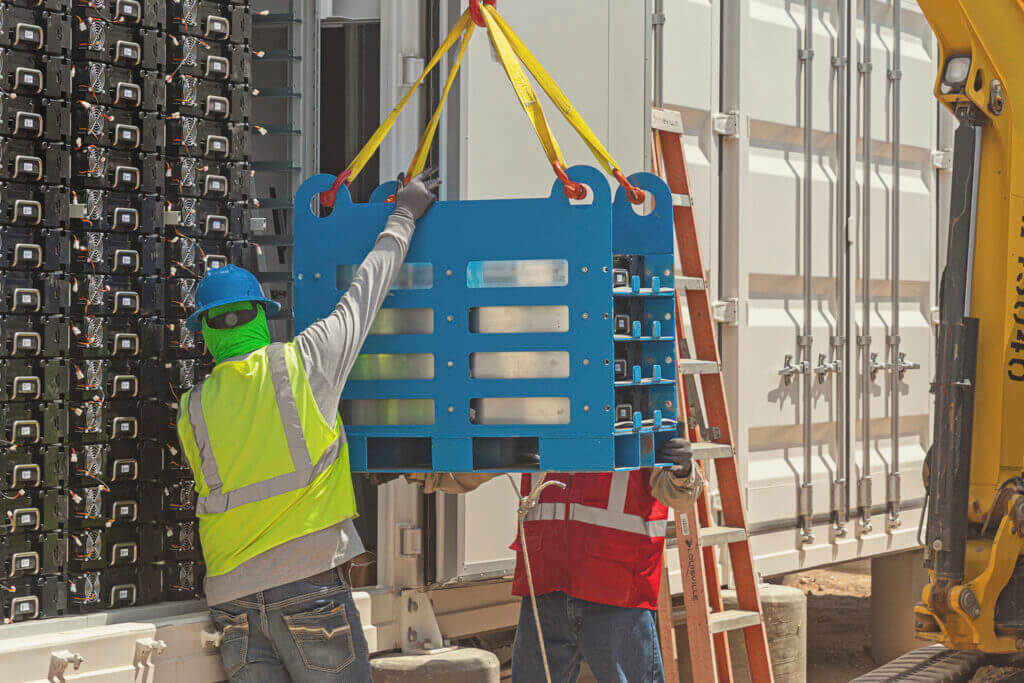
Image: Burns & McDonnell.
Lithium battery energy storage technology mainly refers to the storage of electrical energy. The stored energy can be used as emergency energy, and can also be used to store energy when the grid load is low, and output energy when the grid load is high, for peak shaving and valley filling, to reduce grid fluctuations. The following is the basic common sense about lithium battery energy storage technology.
So far, people have proposed and developed a variety of energy storage technologies to meet the application in different fields and different needs. Lithium battery energy storage is currently the most feasible technical route.
The working principle of lithium battery energy storage refers to its charging and discharging principle. When the battery is charged, lithium is generated on the positive electrode of the battery, and the generated lithium moves to the negative electrode through the electrolyte. The carbon as the negative electrode has a layered structure. It has many micropores. The lithium that reaches the negative electrode is embedded in the micropores of the carbon layer. The more lithium is inserted, the higher the charging capacity.
In the same way, when the battery is discharged (that is when we use the battery), the lithium embedded in the carbon layer of the negative electrode is released and moves back to the positive electrode. The more lithium returned to the positive electrode, the higher the discharge capacity. What we usually call battery capacity refers to the discharge capacity.
From the perspective of the economics of energy storage technology, lithium batteries have strong competitiveness. Sodium-sulfur batteries and vanadium flow batteries have not been industrialized, their supply channels are limited, and the cost is expensive. From the perspective of operating and maintenance costs, sodium-sulfur batteries must continue to supply heat, and vanadium redox batteries must be pumped for fluid control, which increases operating costs. Lithium batteries require almost no maintenance.
The battery has its shortcomings due to its high energy consumption, high pollution, and resource nature. In recent years, the rapid development of lithium battery energy storage technology has gradually highlighted its advantages. Compared with traditional lead-acid batteries, lithium batteries have high energy density and volume. It has the advantages of small size, lightweight, long service life, and wide operating temperature range.
Lithium batteries are a very important energy storage technology, which is widely used in portable electronic devices and new energy vehicles. The cost of energy storage batteries worldwide is continuing to decline. However, future energy storage methods will shift from lithium batteries to more innovative solutions.
Lithium battery energy storage is one of the important means to solve the intermittent volatility of new energy wind power and photovoltaics and realize the function of peak and valley reduction. It will also be used in more important application scenarios in the future. If you want to obtain knowledge related to lithium battery energy storage technology after reading the above content, you can contact us for detailed solutions.
As a professional manufacturer of lithium battery energy storage systems, we continue to develop new technologies and accumulate rich production experience in this field. Our professional production team and strict quality inspection system can provide customers with high-quality and safe products. We can also provide thoughtful one-stop service and formulate effective solutions according to customer needs. If you are interested in our lithium battery energy storage system, please contact us immediately!

扫码关注
We use cookies to understand how our audience uses our site.
Renon Power websites use cookies to deliver and improve the website experience. See our cookie policy for further details on how we use cookies. Privacy Policy